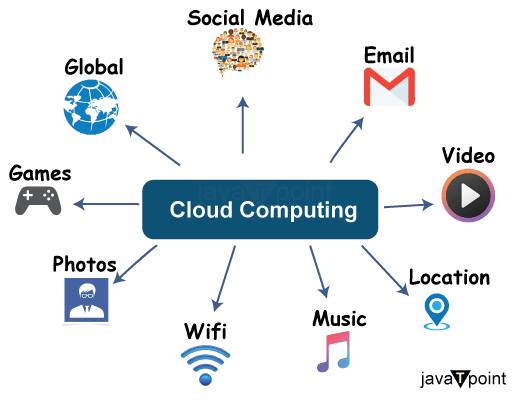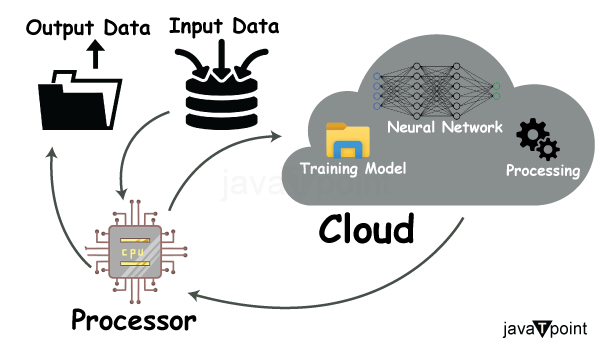Machine Learning and Cloud ComputingIn this technology driven time, Machine Learning and Distributed computing are the most impressive advances around the world. Both these innovations assume a pivotal part for little and huge associations to develop their organizations. AI assists clients with making forecasts and foster calculations that can consequently advance by utilizing verifiable information. However, a number of machines learning algorithms, including Linear Regression, Logistic Regression, SVM, Decision Tree, Naive Bayes, K-Means, random forest, and Gradient Boosting, require a huge measure of capacity that become quite trying for an information researcher as well as AI experts. Distributed computing turns into a distinct advantage for conveying AI models in such circumstances. Machine learning applications are improved and expanded thanks to cloud computing. Intelligent Cloud is another name for the combination of cloud computing and machine learning. This article will talk about machine learning and cloud computing, the benefits of using the cloud for ML, cloud-based applications of ML algorithms, and more. Therefore, let's begin by providing a brief overview of Cloud computing and Machine Learning. What is Machine Learning?Machine Learning is an Artificial Intelligence (AI) application that allows machines to learn and improve from experience automatically. Machine Learning can be classified as follows:
The primary aim of Machine Learning is to provide the capability to computers learn automatically without human intervention or assistance and adjust actions accordingly. What is Cloud Computing?Cloud computing is defined as the outsourcing technology of computer software, which enables us to access applications and data remotely. It does not require any software installation and storage in your computer hard drive. Only you have to sign up to enjoy the services online. 
Types of Cloud ComputingCloud computing is mainly categorized into three types as follows:
Why Cloud computing in Machine LearningAlthough cloud computing and machine learning are emerging technologies, machine learning is comparatively new. Both technologies play important roles in companies' growth, but they become more powerful together. Machine learning makes intelligent machines or software, and on the other hand, cloud computing provides storage and security to access these applications. 
The main connection between machine learning and cloud computing is resource demand. Machine learning requires a lot of processing power, data storage, and many servers simultaneously to work on an algorithm. Then Cloud computing plays a significant role in providing new servers with pre-defined data and changing resources over the Cloud (internet). Using cloud computing, you can spin up any number of servers you want, work on the algorithm, then destroy the machines again when complete. Cloud Computing is primarily used for computation purposes, machine learning needs a lot of computational power to create sample data, and not everyone has access to many strong machines. Machine learning finds (sometimes) task scheduling and storage in cloud computing. Advantages of Machine Learning with Cloud ComputingAlthough machine learning and cloud computing have their advantages individually, together, they have 3 core advantages as follows:
There are so many cloud service providers that offer lots of ML technologies for everyone without having prior knowledge of AI and ML. Top Cloud computing platforms for Machine LearningAlthough there are so many cloud computing platforms available on the internet, few of them are most popular for machine learning. Let's discuss them in detail. 1. Amazon Web Services (AWS)Amazon Web Services (AWS) is one of the most popular cloud computing platforms for Machine Learning, developed by Amazon in 2006. There are so many products provided by AWS as follows:
2. Microsoft Azure:Microsoft Azure is also a popular cloud computing platform offered by Microsoft in 2010. It is popular among data scientists and machine learning professionals for data analytics requirements. There are some Microsoft Azure products available for machine learning as follows:
3. Google CloudGoogle Cloud or Google Cloud Platform is a cloud computing platform that is a subsidiary of Tech Giant Google developed in 2008. It provides its infrastructure to customers for developing machine learning models overcloud. There are a few Google Cloud products available for machine learning as follows:
4. IBM Cloud:IBM Cloud (formerly known as Bluemix) is also one of IBM's most popular open-source cloud computing platforms. It includes various cloud delivery models that are public, private, and hybrid models. There are a few IBM Cloud products available for machine learning as follows: IBM Watson Studio: This product helps develop, run, and manage machine learning and Artificial Intelligent models. IBM Watson Natural Language Understanding: It helps us analyze and classify text in NLP. IBM Watson Speech-to-Text: As the name suggests, this product is responsible for converting speech or voice instructions into text format. IBM Watson Assistant: This product is used for creating and managing the personal virtual assistant. IBM Watson Visual Recognition: it helps machine learning search visual images and classify them. IBM Watson Text-to-Speech: This product is responsible for converting text or written instructions into voice format. We have discussed various cloud computing platforms used in machine learning. These cloud platforms offer machine learning capabilities and provide support for three types of predictions as follows:
Binary Prediction: In this type of machine learning prediction, we get responses either as true or false. Binary predictions are useful for credit card fraud detections, order processing, recommendation systems, etc. Category Prediction: These machine learning predictions are responsible for categorizing a dataset based on experience. For instance, insurance companies use category prediction to categorize different types of claims. Value Prediction: This type of prediction finds patterns within the accumulated data by using learning models to show the quantitative measure of all the likely outcomes. It helps to predict the future sale of products in a manufacturing industry. Applications of Machine Learning Algorithms using the CloudCognitive ComputingCognitive computing is a special type of technology that works on the principle of artificial intelligence and signal processing to reflect human actions. In cognitive computing, a large amount of data is used to train a machine-learning algorithm. When cloud and machine learning technologies are used together, it is called cognitive Cloud, which can be used to access cognitive computing applications. Cognitive Cloud is considered as a self-learning process that performs human-like tasks without human intervention. It uses various machine learning algorithms such as neural networks, pattern recognition, Natural language processing, data mining, etc., to perform human-like actions. It can be applicable in several industries such as retail, logistics, banking & finance, power & energy, cyber security, healthcare, education, and many more. Business intelligence:Business intelligence primarily focuses on improving and making better decisions making for businesses. Machine learning is a process of automated decision making, and on the other end, business intelligence is used to understand, organize and improve that decision making. Further, cloud computing deals with a large amount of data used to train machine learning models; hence business intelligence becomes important to store raw data. Further, this unstructured data is transformed into a structured format using manipulation, transformation, and classification techniques. These structured data sets are referred to as data warehouses. Business analysts work on exploring organized informational indexes utilizing a few information representation strategies. These procedures are utilized to make visual dashboards, which help in figuring out data to other people. The panels are used to modify future strategies to improve KPIs (Key Business Indicators) and assist in analyzing and comprehending previous performance. Internet of Things (IoT)Internet of Things (IoT) is a stage that offers cloud offices, including information stockpiling and handling through Web. As of late, cloud-based ML models are getting famous. It begins with summoning input information from the client end, processes AI calculations utilizing ANN over cloud servers and gets back with result to the client once more. During this situation, the client's delicate data can be put away on the server, raising protection issues, and making clients hesitant to utilize the administrations. Distributed computing is the simplest technique to handle mass information bundles created through IoT over the web. It is by and large utilized for ongoing venture situations as an occasion handling motor. It was used to store IoT data as part of the collaboration and can be accessed remotely. E.g., when IoT is incorporated with individual gadgets, it can get the booking status of your transport and train reservations and rebook these tickets for travellers whose trains got postponed or dropped. Personal Assistant:Because it provides support to customers like a human being, a personal virtual assistant becomes a requirement for growing an organization's business. These days, all ventures like banking, medical services, training, foundation, and so forth., are using chatbots-also known as personal virtual assistants-in their businesses to complete a variety of tasks. Despite the fact that they are still in their creating stage and require greater improvement, they actually lessen the weight to determine normal client issues utilizing a few much of the time got clarification on some pressing issues. Cortana, SIRI, and Alexa are such most famous chatbots. AI-as-a-Service:Nowadays, all big cloud companies are providing AI facilities using AI-as-a-service platforms. Open-source AI functionalities are quite cheaper when deployed in cloud. These services provide Artificial Intelligence and machine learning functionalities, and build the capacity of cognitive computations and make the system more intelligent. It helps to make the system relatively fast and efficient. These days, all big cloud organizations are giving simulated intelligence offices involving man-made intelligence as-a-administration stages. Open-source man-made intelligence functionalities are very less expensive when conveyed in cloud. These administrations give Man-made reasoning and AI functionalities and fabricate the limit of mental calculations and make the framework keener. It contributes to the system's relatively quick and effective operation. ConclusionCloud computing and machine learning are extremely important for technologies of the next generation. The interest in AI is constantly expanding with distributed computing as it offers an ideal climate for AI models having a lot of information. Further, it tends to be utilized to prepare new frameworks, recognize the example, and make expectations. The Cloud offers a versatile, on-request climate to gather, store, curate, and cycle information. Also, all cloud specialist organizations understand the significance of AI in the Cloud; it is expanding the interest of Cloud based ML models to little, mid, and huge associations. AI and distributed computing are fundamentally unrelated to each other. Assuming that AI helps distributed computing to make more improved, proficient, and adaptable, then, at that point, on the opposite end, distributed computing additionally grows the skyline for AI applications. As a result, we can say that Ml and cloud computing are used in conjunction; they can likewise give gigantic outcomes. |
 For Videos Join Our Youtube Channel: Join Now
For Videos Join Our Youtube Channel: Join Now
Feedback
- Send your Feedback to [email protected]
Help Others, Please Share










